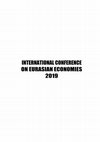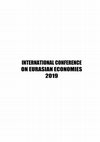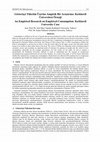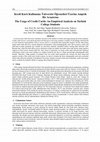Conference Presentations by ASLI OKAY TOPRAK

INTERNATIONAL CONFERENCE ON EURASIAN ECONOMIES, 2019
In recent years, there has been a dramatic increase in the number of credit card usage among univ... more In recent years, there has been a dramatic increase in the number of credit card usage among university students.
Credit cards can be a convenient payment tool that gives university students a number of advantages and benefits
to learn financial responsibility when it can be used in a controlled and responsible manner. On the other hand,
using credit cards also have serious financial consequences when mismanagedly used. The excessive credit card
debt and overdue payments give burden on university students’ shoulders before starting their full-time jobs.
Besides that, when the other debts such as education credits are added, inevitable stress and anxiety make negative
impacts on their newly started adult life. Also, lack of experience on using credit cards and personal financial
information, tend to put some students at a higher financial risk due to a large and perhaps unmanageable debt
burden. Therefore, rising number of students who use credit cards increases the concern for these long-term
negative results of the credit card. In this context, we aim to evaluate the basic demographic and socio-economic
factors that affect the attitudes of Kırklareli University students towards credit card ownership, credit card usage,
and to evaluate the students' ability to manage their financial situation.

INTERNATIONAL CONFERENCE ON EURASIAN ECONOMIES, 2019
Consumption is defined as the use of goods and services produced in order to meet the needs and d... more Consumption is defined as the use of goods and services produced in order to meet the needs and demands.
However, the goods and services consumed are not only indicator of purchase power but also social status. At this
point, the aim of conspicuous consumption comes to the fore. Conspicuous consumption for social status was first
discussed by Thorstein Veblen in his book, The Theory of The Leisure Class, in 1899. According to Veblen, this
kind of consumption is carried out in order to raise the social status by the upper social class and other classes
trying to be similar to them rather than to the need. The views of Veblen are important when considered today's
consumer society and constitute an important point of reference for gaining an insight into the world of overconsumption,
especially for the younger generations. For this reason, in our study, we aim to conduct a
questionnaire for Kırklareli University students in order to understand how the concept of conspicuous
consumption has acquired dimension for university students. As a result of the study, it will be tried to determine
whether the students have conspicuous consumption; which factors are affected if the students turn to conspicuous
consumption and whether the students have loaded symbolic meanings to the commodities they purchased.
Papers by ASLI OKAY TOPRAK
Hayek kendi tercihlerini yasama sansi olan ozgur bireyin ozgur bir piyasada , spontane olusan bir... more Hayek kendi tercihlerini yasama sansi olan ozgur bireyin ozgur bir piyasada , spontane olusan bir duzende toplumu arzu edilen refah duzeyine tasiyacagini savunmaktadir. Buna karsit olarak esitlikci olmasi umulan, devletin planlamaci ekonomik faaliyetleri, totaliter bir guc olarak ozgur bireyi yok sayan yozlasmis bir kolelik sisteminin olusmasina yol acmaktadir. Hayek’e gore bireylerin tercihleri, davranislari ve amaclari merkezi bir otorite tarafindan belirlenmemeli, kisilerin kendilerini gerceklestirme sansi taninmali. Cunku toplumun iliskiler agi ve yapisi insan akli ile cozulemeyecek kadar karmasiktir ve matematiksel hesaplar etkin bir ya pi olusturmakta yetersiz kalmaktadir. Bunun yani sira merkezi otoriter kendilerini denetleyecek bir yapi olusturma konusunda isteksiz davranarak piyasa mekanizmasi icin zaruri olan adalet sistemi onunde set olusturmaktadirlar.

Uluslararası Avrasya ekonomileri konferansı, Jun 1, 2019
Consumption is defined as the use of goods and services produced in order to meet the needs and d... more Consumption is defined as the use of goods and services produced in order to meet the needs and demands. However, the goods and services consumed are not only indicator of purchase power but also social status. At this point, the aim of conspicuous consumption comes to the fore. Conspicuous consumption for social status was first discussed by Thorstein Veblen in his book, The Theory of The Leisure Class, in 1899. According to Veblen, this kind of consumption is carried out in order to raise the social status by the upper social class and other classes trying to be similar to them rather than to the need. The views of Veblen are important when considered today's consumer society and constitute an important point of reference for gaining an insight into the world of overconsumption, especially for the younger generations. For this reason, in our study, we aim to conduct a questionnaire for Kırklareli University students in order to understand how the concept of conspicuous consumption has acquired dimension for university students. As a result of the study, it will be tried to determine whether the students have conspicuous consumption; which factors are affected if the students turn to conspicuous consumption and whether the students have loaded symbolic meanings to the commodities they purchased.

International Conference on Eurasian Economies 2019
In recent years, there has been a dramatic increase in the number of credit card usage among univ... more In recent years, there has been a dramatic increase in the number of credit card usage among university students. Credit cards can be a convenient payment tool that gives university students a number of advantages and benefits to learn financial responsibility when it can be used in a controlled and responsible manner. On the other hand, using credit cards also have serious financial consequences when mismanagedly used. The excessive credit card debt and overdue payments give burden on university students’ shoulders before starting their full-time jobs. Besides that, when the other debts such as education credits are added, inevitable stress and anxiety make negative impacts on their newly started adult life. Also, lack of experience on using credit cards and personal financial information, tend to put some students at a higher financial risk due to a large and perhaps unmanageable debt burden. Therefore, rising number of students who use credit cards increases the concern for these...

RELATIONSHIP BETWEEN BIOCAPACITY EFFICIENCY AND ECONOMIC GROWTH: SUR MODEL ANALYSIS FOR EUROPE, 2023
To investigate the relationship between biocapacity efficiency and economic growth, data from Aus... more To investigate the relationship between biocapacity efficiency and economic growth, data from Austria, Belgium, Germany, Spain, the United Kingdom, Greece, Italy, and the Netherlands were used, which are the European countries with the largest deficits in the biocapacity-ecological footprint balance between 1970 and 2014. Biocapacity measures the biosphere's ability to renew itself and supply the resources and services required to sustain life. It expresses overall human demand for natural resources, waste management, and fertile land for urban activities. The phrase "ecological footprint" refers to the quantity of biologically productive land and water that a population must utilize to maintain the urban infrastructure that it inhabits, create all the resources that it consumes, and remove all the garbage that it generates. An
ecological deficit exists when a country's ecological footprint exceeds its biocapacity as measured by its population. An ecological deficit suggests that a country's ecosystems are unable to absorb extra carbon dioxide discharged into the atmosphere. When calculating national biocapacity productivity, the relative productivity of an average hectare of a specific land-use type is considered. The biocapacity efficiency factor was used as the dependent variable in this study, which evaluated the eight European nations with the greatest ecological deficit. GDP, the fraction of the total population residing in urban agglomerations with populations greater than one million, and electric energy consumption were the independent variables. Seemingly Unrelated Regression (SUR) model's overall findings reveal that the biocapacity productivity factor and GDP are adversely connected. The biocapacity productivity factor decreased by 0.75% for every 1% rise in GDP. Austria and Belgium had the highest influence on the biocapacity productivity factor, according to country-specific information.
The Relationship Between Economic Growth and Public Health Service Expenditures in Upper Middle-Income Countries
Trends in Business and Economics











Uploads
Conference Presentations by ASLI OKAY TOPRAK
Credit cards can be a convenient payment tool that gives university students a number of advantages and benefits
to learn financial responsibility when it can be used in a controlled and responsible manner. On the other hand,
using credit cards also have serious financial consequences when mismanagedly used. The excessive credit card
debt and overdue payments give burden on university students’ shoulders before starting their full-time jobs.
Besides that, when the other debts such as education credits are added, inevitable stress and anxiety make negative
impacts on their newly started adult life. Also, lack of experience on using credit cards and personal financial
information, tend to put some students at a higher financial risk due to a large and perhaps unmanageable debt
burden. Therefore, rising number of students who use credit cards increases the concern for these long-term
negative results of the credit card. In this context, we aim to evaluate the basic demographic and socio-economic
factors that affect the attitudes of Kırklareli University students towards credit card ownership, credit card usage,
and to evaluate the students' ability to manage their financial situation.
However, the goods and services consumed are not only indicator of purchase power but also social status. At this
point, the aim of conspicuous consumption comes to the fore. Conspicuous consumption for social status was first
discussed by Thorstein Veblen in his book, The Theory of The Leisure Class, in 1899. According to Veblen, this
kind of consumption is carried out in order to raise the social status by the upper social class and other classes
trying to be similar to them rather than to the need. The views of Veblen are important when considered today's
consumer society and constitute an important point of reference for gaining an insight into the world of overconsumption,
especially for the younger generations. For this reason, in our study, we aim to conduct a
questionnaire for Kırklareli University students in order to understand how the concept of conspicuous
consumption has acquired dimension for university students. As a result of the study, it will be tried to determine
whether the students have conspicuous consumption; which factors are affected if the students turn to conspicuous
consumption and whether the students have loaded symbolic meanings to the commodities they purchased.
Papers by ASLI OKAY TOPRAK
ecological deficit exists when a country's ecological footprint exceeds its biocapacity as measured by its population. An ecological deficit suggests that a country's ecosystems are unable to absorb extra carbon dioxide discharged into the atmosphere. When calculating national biocapacity productivity, the relative productivity of an average hectare of a specific land-use type is considered. The biocapacity efficiency factor was used as the dependent variable in this study, which evaluated the eight European nations with the greatest ecological deficit. GDP, the fraction of the total population residing in urban agglomerations with populations greater than one million, and electric energy consumption were the independent variables. Seemingly Unrelated Regression (SUR) model's overall findings reveal that the biocapacity productivity factor and GDP are adversely connected. The biocapacity productivity factor decreased by 0.75% for every 1% rise in GDP. Austria and Belgium had the highest influence on the biocapacity productivity factor, according to country-specific information.
Credit cards can be a convenient payment tool that gives university students a number of advantages and benefits
to learn financial responsibility when it can be used in a controlled and responsible manner. On the other hand,
using credit cards also have serious financial consequences when mismanagedly used. The excessive credit card
debt and overdue payments give burden on university students’ shoulders before starting their full-time jobs.
Besides that, when the other debts such as education credits are added, inevitable stress and anxiety make negative
impacts on their newly started adult life. Also, lack of experience on using credit cards and personal financial
information, tend to put some students at a higher financial risk due to a large and perhaps unmanageable debt
burden. Therefore, rising number of students who use credit cards increases the concern for these long-term
negative results of the credit card. In this context, we aim to evaluate the basic demographic and socio-economic
factors that affect the attitudes of Kırklareli University students towards credit card ownership, credit card usage,
and to evaluate the students' ability to manage their financial situation.
However, the goods and services consumed are not only indicator of purchase power but also social status. At this
point, the aim of conspicuous consumption comes to the fore. Conspicuous consumption for social status was first
discussed by Thorstein Veblen in his book, The Theory of The Leisure Class, in 1899. According to Veblen, this
kind of consumption is carried out in order to raise the social status by the upper social class and other classes
trying to be similar to them rather than to the need. The views of Veblen are important when considered today's
consumer society and constitute an important point of reference for gaining an insight into the world of overconsumption,
especially for the younger generations. For this reason, in our study, we aim to conduct a
questionnaire for Kırklareli University students in order to understand how the concept of conspicuous
consumption has acquired dimension for university students. As a result of the study, it will be tried to determine
whether the students have conspicuous consumption; which factors are affected if the students turn to conspicuous
consumption and whether the students have loaded symbolic meanings to the commodities they purchased.
ecological deficit exists when a country's ecological footprint exceeds its biocapacity as measured by its population. An ecological deficit suggests that a country's ecosystems are unable to absorb extra carbon dioxide discharged into the atmosphere. When calculating national biocapacity productivity, the relative productivity of an average hectare of a specific land-use type is considered. The biocapacity efficiency factor was used as the dependent variable in this study, which evaluated the eight European nations with the greatest ecological deficit. GDP, the fraction of the total population residing in urban agglomerations with populations greater than one million, and electric energy consumption were the independent variables. Seemingly Unrelated Regression (SUR) model's overall findings reveal that the biocapacity productivity factor and GDP are adversely connected. The biocapacity productivity factor decreased by 0.75% for every 1% rise in GDP. Austria and Belgium had the highest influence on the biocapacity productivity factor, according to country-specific information.